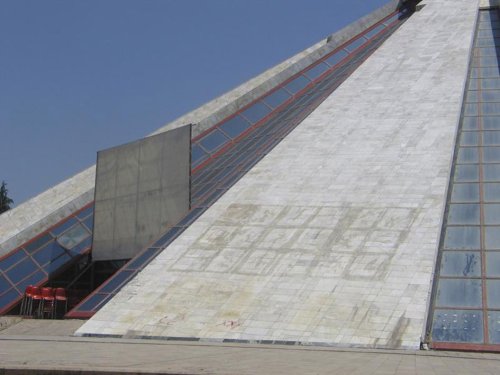Alejandro Vidal
dal 29/6/2005 al 30/6/2005
Segnalato da
29/6/2005
Alejandro Vidal
Enver Hoxha's Pyramid, Tirana
Disrupted noise terror. For 1/60 insurgent space. For his project the artist has prepared an intrusion in one of the city hottest spots, opened in 1988 as a museum dedicated to the Albanian dictator Enver Hoxha. In close connection with his recent analysis about the connections between music, politics and audiences Vidal will destabilize the city, in its general election days, parking a car droved by people dressed in ex-military regime uniforms playing Turbo-Folk music.

Disrupted noise terror
1/60 insurgent space is the name of a space that move itself continuously
inside the cities, producing exhibitions whose intent is to put to
comparison international artists with various places, different from the
"institutional ones", in order to create new arguments around the art and
its borders. This is the sixth of a series of nine exhibitions programmed
in Tirana, from January until September, curated every month by Stefano
Romano and a different curator each time.
Alejandro Vidal is a Spanish artist operating in an always complex and
mutant territory. This is defined by political strategies, legal and illegal
matters, insurrectionary situations and links with society and youth new
codes and subterfuges.
For his project in Tirana, Albania, he has prepared an intrusion in one of
the city hottest spots popularly know as ‘The 'pyramid,' It was opened in
1988 as a museum dedicated to the Albanian dictator Enver Hoxha. Designed by
Hoxha's daughter Pranvera, the building was reportedly the most expensive
ever erected in Albania. After the regime collapsed, the memorial (in a
refreshing bit of iconoclasm) was converted into a conference center and
discoteche. Meanwhile, the skive youth of Tirana have discovered that the
building's 30-degree slopes are ideal for climbing up and sliding down.
Albania history has a sometimes controversial relation with Pyramids. Ismail
Kadare, the famous Albanian contemporary writer and several-time nominee for
the Nobel Prize, wrote a book called Piramida (The Pyramid) ,Pharaohns like
his ex-dictator Hoxha use a totalitarian method of myth construction.
Albanians also learned about pyramids as depositing money with the hope of
obtaining big interest rates. When these pyramid schemes failed in the
spring of 1997 widespread rioting resulted. The resulting riots led to the
death of more than 1,500 people and thousands of machine guns fell into the
hands of citizens when they looted the military armories. Soon criminal
gangs controlled the countryside and Albania nearly collapsed in total
anarchy.
In close connection with his recent analysis about the connections between
music, politics and audiences Vidal will destabilized the city, in its
general election days, parking a car droved by people dressed in ex-military
regime uniforms playing loud Turbo-Folk music. The car will be loaded with
a powerful sound system that will blast hypnotic rhythms to the crowd. Could
be Vidal’s intention to start that way an illegal free-rave party in the
heart of Tirana?
Besides that, just in the same spot in Tirana, Alejandro Vidal will
interfere the usual programme of a public street Maxi-Screen to present one
of his most recent Videos. Vidal video work investigates different notions
related to the aesthetics that are prior to violence staging a wide variety
of martial art techniques, urban guerrilla tactics and organized crime
procedures. His videos are commonly associated with a nihilistic and
dissatisfied urban youth culture and show influences brought from eighties
action movies, punk-rock or DJ imagery.
Turbo-Folk is a blend of various musical traditions, including popular music
of Serbian and Roma brass bands, Middle Eastern beats, Turkish and Greek pop
music on the one side and rock and roll and contemporary electronic dance
music on the other.
Turbo-folk is often dismissed as vulgar, almost pornographic kitsch
glorifying a culture of crime,corruption ,mafia and war. Yet turbo-folk was
equally popular amongst all the Southern Slav nations during the brutal wars
of the 1990s, reflecting perhaps the common cultural sentiments of the
warring sides.
When a market seller in Sarajevo was asked why in the midst of a Serb
bombing of the city he illegally sold CDs of the turbo-folk superstar Ceca,
a wife of the notorious Serbian warlord Arkan, he offered a laconic retort:
"Art knows no borders!" Indeed, one of the greatest of Ceca's hits at the
time, "If you were wounded, I'd give you my blood..." could be heard in the
trenches of both sides.
Alejandro Vidal, born 1972, lives and works in Barcelona, Spain. He has
recently had solo exhibitions at MOT in London and Galerie Adler in
Frankfurt. His work has been exhibited widely trough Europe being presented
at the Museum of Contemporary Art in Belgrade, Galleria Artra in Milano or
in Group shows like ‘ Personne n’est Innocent’ at Le Confort Moderne in
France. Among his forthcoming projects he will present in September ‘ A
thousand lonely suicides’ at Play Gallery in Berlin, Germany.
Produced by: 1/60 insurgent space
Inputs director: Stefano Romano – sr_inbox@yahoo.com
Curator: Stefano Romano and Elsa Martini
Coordination of the exhibitions: Edi Muka
Artist website: http://www.alejandro-vidal.com
THURSDAY 30TH OF JUNE 2005 AT 8 PM
Enver Hoxha's Pyramid
Blvd Deshmoret e Kombit
Tirana



